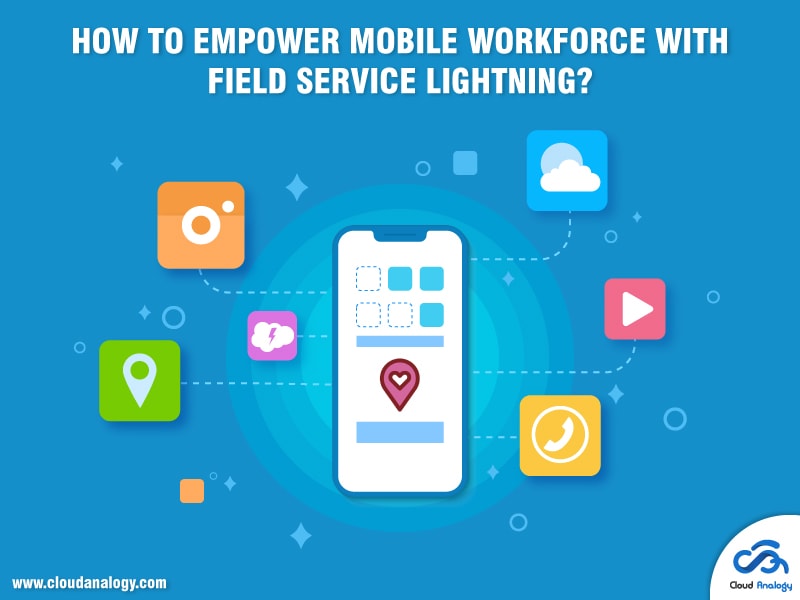Sharing is caring!
Disruptive Technologies offer organizations amazing opportunities to take a proactive approach to enhance customer journeys and customer experience, and the potential is limitless. Examples include smart homes that proactively notify service teams when an air conditioning or oven unit is about to fail, so the technicians can fix the issue before the machine gets into a breakdown situation; or industrial-scale machines and devices that send performance signals on a regular basis to field technicians for the purpose of routine maintenance. This is exactly where Field Service Lightning (FSL) is promising the world with zero down-time.
According to Gartner, there will be more than 20 billion connected ‘things’ by the end of the year 2020. This presents a humongous opportunity for organizations to offer invaluable post-sales services to customers with a predefined purpose of increasing overall lifetime customer value, and ultimately assist customers to get more value out of their purchased products.
Unfortunately, more than 70 percent of businesses report that data silos exist within their organization. This can have massive negative impacts such as critical information like outages or device breakdowns from reaching the right people on the front lines. After all, what good is a ‘connected’ thing if the signals sent by it don’t reach the right individual at the right time and the right place?
Now comes the Lightning Component within Salesforce Field Service Lightning. It is because of this out-of-the-box solution that IoT (the Internet of Things) signals directly show up within the Salesforce Service Cloud and FSL mobile app consoles alongside the customer relationship (CRM) data, offering organizations the data they require for delivering predictive, proactive, and personalized customer service solutions.
Thanks to FSL, service organizations can now easily:
Diagnose and anticipate issues remotely: Customer service agents, on the basis of IoT signals that get surfaced in the Salesforce Service Cloud console, can promptly gauge whether the failure of a device is imminent. Furthermore, they can quickly identify the source of the problem (often even before the customer is aware that an issue exists).
Thereafter, the right mobile worker can be timely dispatched to handle the issue(s) to enhance customer satisfaction levels. Both the customer service agent and the mobile field worker can have a holistic view of the history of customer service by overlaying IoT with CRM data in the FSL mobile app and the Service Cloud Console.
Empower workers with the exact information they require: Today, mobile workers can quickly learn about what kind of fixing or servicing is required even before they arrive at the site. In other words, Field Service Lightning helps them show up prepared beforehand with the right knowledge and equipment. Thanks to this information, mobile workers can avoid having to shuttle back and forth from the warehouse for picking up the right tool or equipment.
If this is not all, field technicians are powered with everything they require – customer data, device data, information about the issue, and the right documentation – to fix the connected device onsite and ensure that the faulty thing is repaired to the best of the customer’s satisfaction before they leave.
Automate case and work order creation: Organizations can leverage automation, rules, and guided processes to take innumerable advantages of orchestration capabilities combined with the right set of IoT signals for triggering the creation of work orders and cases on an automatic basis.
For instance, organizations can create and set rules for triggering the creation of a case and then proceed to deploy the right field agent automatically the moment a device starts malfunctioning. Obviously, this assists teams to focus less on the cumbersome administrative work and emphasize more on higher-value projects, like actually working to solve the root of the customer’s problem.
These are just some of the many ways by which Cloud Analogy, one of the world’s leading Field Service Lightning Organizations, is fundamentally transforming customer services through data and innovation.

Akshay Dhiman
Chief Technical Officer
Akshay Dhiman, the CTO of Cloud Analogy, has been a standout and successful Salesforce Platform Developer for years. He has a rich experience in Salesforce Integration, JavaScript, APEX, VisualForce, Force.com Sites, Batch Processing, Lightning, PHP, C++, Java, NodeJs, ReactJs, Angular 8, GraphQL, React Native, Web Technology, and jQuery.Hire the best Salesforce Development Company. Choose certified Salesforce Developers from Cloud Analogy now.









